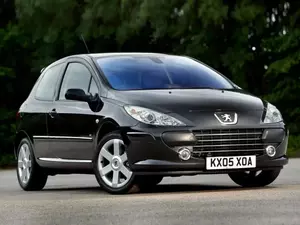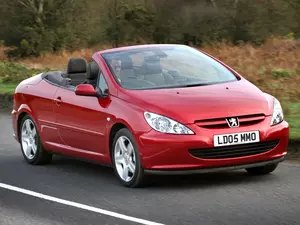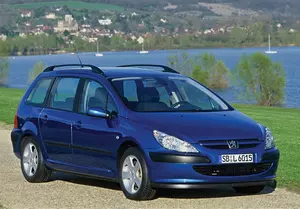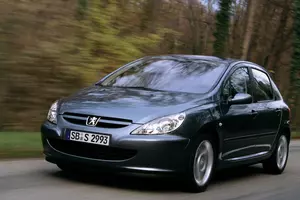
| Vehicle | Curb weight | Difference from world's smallest | Weight to power ratio | 0—60 mph acceleration ratio | Consumption ratio |
|---|---|---|---|---|---|
| 1.6i |
1453 kg / 3204 lbs |
1028 kg (2267 lbs) heavier | 13 kg to 1 hp | 120 kg/s (265 lbs/s) |
191 kg/L (421 lbs/L) |
| 2.0i |
1578 kg / 3479 lbs |
1153 kg (2542 lbs) heavier | 9 kg to 1 hp | 177 kg/s (390 lbs/s) |
179 kg/L (395 lbs/L) |
| 2.0 HDi |
1578 kg / 3479 lbs |
1153 kg (2542 lbs) heavier | 12 kg to 1 hp | 161 kg/s (355 lbs/s) |
263 kg/L (580 lbs/L) |
| Vehicle | 1.6i |
|---|---|
| Curb weight |
1453 kg / 3204 lbs |
| Difference from world's smallest | 1028 kg (1028 lbs) heavier |
| Weight to power ratio | 13 kg to 1 hp |
| 0—60 mph acceleration ratio | 120 kg/s (265 lbs/s) |
| Consumption ratio |
191 kg/L (421 lbs/L) |
| Vehicle | 2.0i |
| Curb weight |
1578 kg / 3479 lbs |
| Difference from world's smallest | 1153 kg (1153 lbs) heavier |
| Weight to power ratio | 9 kg to 1 hp |
| 0—60 mph acceleration ratio | 177 kg/s (390 lbs/s) |
| Consumption ratio |
179 kg/L (395 lbs/L) |
| Vehicle | 2.0 HDi |
| Curb weight |
1578 kg / 3479 lbs |
| Difference from world's smallest | 1153 kg (1153 lbs) heavier |
| Weight to power ratio | 12 kg to 1 hp |
| 0—60 mph acceleration ratio | 161 kg/s (355 lbs/s) |
| Consumption ratio |
263 kg/L (580 lbs/L) |

| Vehicle | Curb weight | Difference from world's smallest | Weight to power ratio | 0—60 mph acceleration ratio | Consumption ratio |
|---|---|---|---|---|---|
| 1.4i |
1158 kg / 2553 lbs |
733 kg (1616 lbs) heavier | 13 kg to 1 hp | 95 kg/s (209 lbs/s) |
178 kg/L (392 lbs/L) |
| 1.6i |
1187 kg / 2617 lbs |
762 kg (1680 lbs) heavier | 11 kg to 1 hp | 118 kg/s (260 lbs/s) |
160 kg/L (353 lbs/L) |
| 2.0i |
1286 kg / 2836 lbs |
861 kg (1899 lbs) heavier | 7 kg to 1 hp | 153 kg/s (337 lbs/s) |
153 kg/L (337 lbs/L) |
| 1.6 HDi |
1243 kg / 2741 lbs |
818 kg (1804 lbs) heavier | 14 kg to 1 hp | 104 kg/s (229 lbs/s) |
254 kg/L (560 lbs/L) |
| 2.0 HDi |
1352 kg / 2981 lbs |
927 kg (2044 lbs) heavier | 10 kg to 1 hp | 145 kg/s (320 lbs/s) |
250 kg/L (551 lbs/L) |
| Vehicle | 1.4i |
|---|---|
| Curb weight |
1158 kg / 2553 lbs |
| Difference from world's smallest | 733 kg (733 lbs) heavier |
| Weight to power ratio | 13 kg to 1 hp |
| 0—60 mph acceleration ratio | 95 kg/s (209 lbs/s) |
| Consumption ratio |
178 kg/L (392 lbs/L) |
| Vehicle | 1.6i |
| Curb weight |
1187 kg / 2617 lbs |
| Difference from world's smallest | 762 kg (762 lbs) heavier |
| Weight to power ratio | 11 kg to 1 hp |
| 0—60 mph acceleration ratio | 118 kg/s (260 lbs/s) |
| Consumption ratio |
160 kg/L (353 lbs/L) |
| Vehicle | 2.0i |
| Curb weight |
1286 kg / 2836 lbs |
| Difference from world's smallest | 861 kg (861 lbs) heavier |
| Weight to power ratio | 7 kg to 1 hp |
| 0—60 mph acceleration ratio | 153 kg/s (337 lbs/s) |
| Consumption ratio |
153 kg/L (337 lbs/L) |
| Vehicle | 1.6 HDi |
| Curb weight |
1243 kg / 2741 lbs |
| Difference from world's smallest | 818 kg (818 lbs) heavier |
| Weight to power ratio | 14 kg to 1 hp |
| 0—60 mph acceleration ratio | 104 kg/s (229 lbs/s) |
| Consumption ratio |
254 kg/L (560 lbs/L) |
| Vehicle | 2.0 HDi |
| Curb weight |
1352 kg / 2981 lbs |
| Difference from world's smallest | 927 kg (927 lbs) heavier |
| Weight to power ratio | 10 kg to 1 hp |
| 0—60 mph acceleration ratio | 145 kg/s (320 lbs/s) |
| Consumption ratio |
250 kg/L (551 lbs/L) |

| Vehicle | Curb weight | Difference from world's smallest | Weight to power ratio | 0—60 mph acceleration ratio | Consumption ratio |
|---|---|---|---|---|---|
| 2.0 HDi |
1606 kg / 3541 lbs |
1181 kg (2604 lbs) heavier | 12 kg to 1 hp | - |
233 kg/L (514 lbs/L) |
| 1.6 |
1469 kg / 3239 lbs |
1044 kg (2302 lbs) heavier | 13 kg to 1 hp | - |
177 kg/L (390 lbs/L) |
| 2.0 |
1493 kg / 3292 lbs |
1068 kg (2355 lbs) heavier | 11 kg to 1 hp | - |
178 kg/L (392 lbs/L) |
| 1.6 HDi |
1394 kg / 3074 lbs |
969 kg (2137 lbs) heavier | 15 kg to 1 hp | 111 kg/s (245 lbs/s) |
273 kg/L (602 lbs/L) |
| Vehicle | 2.0 HDi |
|---|---|
| Curb weight |
1606 kg / 3541 lbs |
| Difference from world's smallest | 1181 kg (1181 lbs) heavier |
| Weight to power ratio | 12 kg to 1 hp |
| 0—60 mph acceleration ratio | - |
| Consumption ratio |
233 kg/L (514 lbs/L) |
| Vehicle | 1.6 |
| Curb weight |
1469 kg / 3239 lbs |
| Difference from world's smallest | 1044 kg (1044 lbs) heavier |
| Weight to power ratio | 13 kg to 1 hp |
| 0—60 mph acceleration ratio | - |
| Consumption ratio |
177 kg/L (390 lbs/L) |
| Vehicle | 2.0 |
| Curb weight |
1493 kg / 3292 lbs |
| Difference from world's smallest | 1068 kg (1068 lbs) heavier |
| Weight to power ratio | 11 kg to 1 hp |
| 0—60 mph acceleration ratio | - |
| Consumption ratio |
178 kg/L (392 lbs/L) |
| Vehicle | 1.6 HDi |
| Curb weight |
1394 kg / 3074 lbs |
| Difference from world's smallest | 969 kg (969 lbs) heavier |
| Weight to power ratio | 15 kg to 1 hp |
| 0—60 mph acceleration ratio | 111 kg/s (245 lbs/s) |
| Consumption ratio |
273 kg/L (602 lbs/L) |

| Vehicle | Curb weight | Difference from world's smallest | Weight to power ratio | 0—60 mph acceleration ratio | Consumption ratio |
|---|---|---|---|---|---|
| 2.0 i 16V |
1457 kg / 3213 lbs |
1032 kg (2276 lbs) heavier | 11 kg to 1 hp | 140 kg/s (309 lbs/s) |
178 kg/L (392 lbs/L) |
| 2.0 i 16V RC |
1490 kg / 3285 lbs |
1065 kg (2348 lbs) heavier | 8 kg to 1 hp | 167 kg/s (368 lbs/s) |
169 kg/L (373 lbs/L) |
| Vehicle | 2.0 i 16V |
|---|---|
| Curb weight |
1457 kg / 3213 lbs |
| Difference from world's smallest | 1032 kg (1032 lbs) heavier |
| Weight to power ratio | 11 kg to 1 hp |
| 0—60 mph acceleration ratio | 140 kg/s (309 lbs/s) |
| Consumption ratio |
178 kg/L (392 lbs/L) |
| Vehicle | 2.0 i 16V RC |
| Curb weight |
1490 kg / 3285 lbs |
| Difference from world's smallest | 1065 kg (1065 lbs) heavier |
| Weight to power ratio | 8 kg to 1 hp |
| 0—60 mph acceleration ratio | 167 kg/s (368 lbs/s) |
| Consumption ratio |
169 kg/L (373 lbs/L) |

| Vehicle | Curb weight | Difference from world's smallest | Weight to power ratio | 0—60 mph acceleration ratio | Consumption ratio |
|---|---|---|---|---|---|
| 2.0 16V |
1355 kg / 2988 lbs |
930 kg (2051 lbs) heavier | 10 kg to 1 hp | 136 kg/s (300 lbs/s) |
163 kg/L (359 lbs/L) |
| 1.6 16 V |
1324 kg / 2919 lbs |
899 kg (1982 lbs) heavier | 12 kg to 1 hp | 117 kg/s (258 lbs/s) |
172 kg/L (379 lbs/L) |
| 1.6 HDI |
1402 kg / 3091 lbs |
977 kg (2154 lbs) heavier | 13 kg to 1 hp | 123 kg/s (271 lbs/s) |
280 kg/L (617 lbs/L) |
| 2.0 HDi |
1390 kg / 3065 lbs |
965 kg (2128 lbs) heavier | 15 kg to 1 hp | 107 kg/s (236 lbs/s) |
257 kg/L (567 lbs/L) |
| Vehicle | 2.0 16V |
|---|---|
| Curb weight |
1355 kg / 2988 lbs |
| Difference from world's smallest | 930 kg (930 lbs) heavier |
| Weight to power ratio | 10 kg to 1 hp |
| 0—60 mph acceleration ratio | 136 kg/s (300 lbs/s) |
| Consumption ratio |
163 kg/L (359 lbs/L) |
| Vehicle | 1.6 16 V |
| Curb weight |
1324 kg / 2919 lbs |
| Difference from world's smallest | 899 kg (899 lbs) heavier |
| Weight to power ratio | 12 kg to 1 hp |
| 0—60 mph acceleration ratio | 117 kg/s (258 lbs/s) |
| Consumption ratio |
172 kg/L (379 lbs/L) |
| Vehicle | 1.6 HDI |
| Curb weight |
1402 kg / 3091 lbs |
| Difference from world's smallest | 977 kg (977 lbs) heavier |
| Weight to power ratio | 13 kg to 1 hp |
| 0—60 mph acceleration ratio | 123 kg/s (271 lbs/s) |
| Consumption ratio |
280 kg/L (617 lbs/L) |
| Vehicle | 2.0 HDi |
| Curb weight |
1390 kg / 3065 lbs |
| Difference from world's smallest | 965 kg (965 lbs) heavier |
| Weight to power ratio | 15 kg to 1 hp |
| 0—60 mph acceleration ratio | 107 kg/s (236 lbs/s) |
| Consumption ratio |
257 kg/L (567 lbs/L) |

| Vehicle | Curb weight | Difference from world's smallest | Weight to power ratio | 0—60 mph acceleration ratio | Consumption ratio |
|---|---|---|---|---|---|
| 2.0 |
1202 kg / 2650 lbs |
777 kg (1713 lbs) heavier | 9 kg to 1 hp | 138 kg/s (304 lbs/s) |
152 kg/L (335 lbs/L) |
| 1.6 |
1176 kg / 2593 lbs |
751 kg (1656 lbs) heavier | 11 kg to 1 hp | 112 kg/s (247 lbs/s) |
163 kg/L (359 lbs/L) |
| 1.4 |
1142 kg / 2518 lbs |
717 kg (1581 lbs) heavier | 15 kg to 1 hp | 82 kg/s (181 lbs/s) |
170 kg/L (375 lbs/L) |
| 1.4 HDi |
1179 kg / 2600 lbs |
754 kg (1663 lbs) heavier | 17 kg to 1 hp | 75 kg/s (165 lbs/s) |
262 kg/L (578 lbs/L) |
| 1.4 i 16V |
1153 kg / 2542 lbs |
728 kg (1605 lbs) heavier | 13 kg to 1 hp | 95 kg/s (209 lbs/s) |
177 kg/L (390 lbs/L) |
| 1.6 HDi |
1255 kg / 2767 lbs |
830 kg (1830 lbs) heavier | 12 kg to 1 hp | 118 kg/s (260 lbs/s) |
256 kg/L (564 lbs/L) |
| 2.0 HDi |
1279 kg / 2820 lbs |
854 kg (1883 lbs) heavier | 12 kg to 1 hp | 123 kg/s (271 lbs/s) |
246 kg/L (542 lbs/L) |
| 2.0 HDI |
1243 kg / 2741 lbs |
818 kg (1804 lbs) heavier | 14 kg to 1 hp | 102 kg/s (225 lbs/s) |
239 kg/L (527 lbs/L) |
| Vehicle | 2.0 |
|---|---|
| Curb weight |
1202 kg / 2650 lbs |
| Difference from world's smallest | 777 kg (777 lbs) heavier |
| Weight to power ratio | 9 kg to 1 hp |
| 0—60 mph acceleration ratio | 138 kg/s (304 lbs/s) |
| Consumption ratio |
152 kg/L (335 lbs/L) |
| Vehicle | 1.6 |
| Curb weight |
1176 kg / 2593 lbs |
| Difference from world's smallest | 751 kg (751 lbs) heavier |
| Weight to power ratio | 11 kg to 1 hp |
| 0—60 mph acceleration ratio | 112 kg/s (247 lbs/s) |
| Consumption ratio |
163 kg/L (359 lbs/L) |
| Vehicle | 1.4 |
| Curb weight |
1142 kg / 2518 lbs |
| Difference from world's smallest | 717 kg (717 lbs) heavier |
| Weight to power ratio | 15 kg to 1 hp |
| 0—60 mph acceleration ratio | 82 kg/s (181 lbs/s) |
| Consumption ratio |
170 kg/L (375 lbs/L) |
| Vehicle | 1.4 HDi |
| Curb weight |
1179 kg / 2600 lbs |
| Difference from world's smallest | 754 kg (754 lbs) heavier |
| Weight to power ratio | 17 kg to 1 hp |
| 0—60 mph acceleration ratio | 75 kg/s (165 lbs/s) |
| Consumption ratio |
262 kg/L (578 lbs/L) |
| Vehicle | 1.4 i 16V |
| Curb weight |
1153 kg / 2542 lbs |
| Difference from world's smallest | 728 kg (728 lbs) heavier |
| Weight to power ratio | 13 kg to 1 hp |
| 0—60 mph acceleration ratio | 95 kg/s (209 lbs/s) |
| Consumption ratio |
177 kg/L (390 lbs/L) |
| Vehicle | 1.6 HDi |
| Curb weight |
1255 kg / 2767 lbs |
| Difference from world's smallest | 830 kg (830 lbs) heavier |
| Weight to power ratio | 12 kg to 1 hp |
| 0—60 mph acceleration ratio | 118 kg/s (260 lbs/s) |
| Consumption ratio |
256 kg/L (564 lbs/L) |
| Vehicle | 2.0 HDi |
| Curb weight |
1279 kg / 2820 lbs |
| Difference from world's smallest | 854 kg (854 lbs) heavier |
| Weight to power ratio | 12 kg to 1 hp |
| 0—60 mph acceleration ratio | 123 kg/s (271 lbs/s) |
| Consumption ratio |
246 kg/L (542 lbs/L) |
| Vehicle | 2.0 HDI |
| Curb weight |
1243 kg / 2741 lbs |
| Difference from world's smallest | 818 kg (818 lbs) heavier |
| Weight to power ratio | 14 kg to 1 hp |
| 0—60 mph acceleration ratio | 102 kg/s (225 lbs/s) |
| Consumption ratio |
239 kg/L (527 lbs/L) |